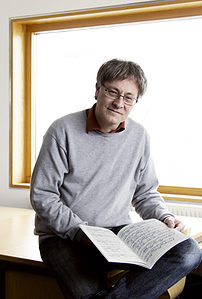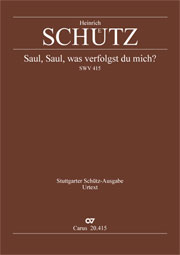Deep Impressions
For the first time, Uwe Wolf got to know Heinrich Schütz’s Saul in his youth when he was just joining the choir as bass. The piece made such a deep impression on the boy, it continues to this day …
Hardly any other work made such a deep impression on me in my youth as Saul by Heinrich Schütz, which I sang for the first time as a young bass aged perhaps 14 or 15. And it continues to exert its fascination today: when, towards the end, the tenor emerges from the tutti with his step-wise ascending calls of “Saul”, you simply cannot avoid getting goose-bumps (and I think of Handel!). It is no coincidence that Saul played a prominent role in the reception of Schütz’s works: Carl von Winterfeld published the work in 1834 in the music section of his book on Gabrieli, which led to numerous performances in the 19th century, including one in 1864 by Johannes Brahms. Schütz’s Saul thus became the starting point for the rediscovery of the composer and remains to this day – and rightly so – one of his best-known compositions.
But Saul is not an independent work, it comes from Part 3 of the Symphoniae Sacrae, a true treasure trove of magnificent sacred concertos, often with a high “choral factor” and always music “which gets under the skin”. The Symphoniae Sacrae III have just been released as part of the complete recording by the Dresdner Kammerchor under Hans-Christoph Rademann. This once again demonstrates what a treasure Schütz created here. Listening to Saul (and other works) in this splendid recording spurred me on to write this short piece: if I had a choir, instead of listening to the work I would be much more inclined to give out the music straight away …
As a musicologist, Dr. Uwe Wolf is particularly at home in the 17th and 18th centuries. The focus of his work ranges from the time of Monteverdi and Schütz to Bach and the generation of Bach’s sons and pupils through to Viennese Classicism. He has been head of the editorial department at Carus-Verlag since October 2011. Prior to this, he worked in Bach research for over 20 years.







Leave a Reply
Want to join the discussion?Feel free to contribute!